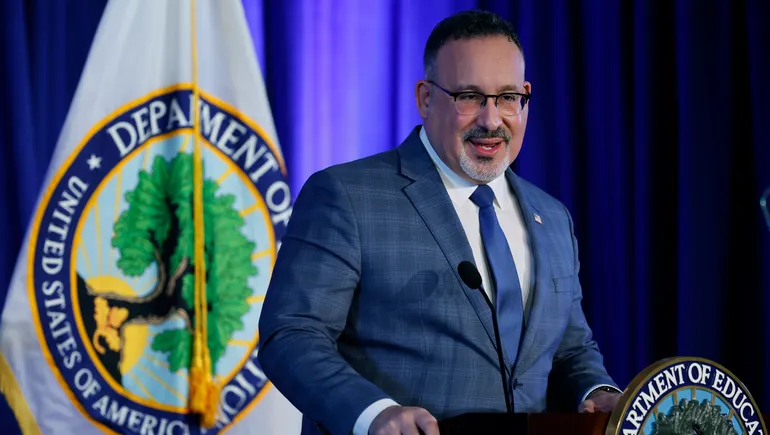The U.S. Department of Education announced Tuesday it will reduce verification requirements this year for the Free Application for Federal Student Aid amid the rocky release of the updated form.
The adjustments are intended to make it easier for colleges to process student records and issue financial aid officers during this cycle’s abbreviated timeline.
The Education Department will require college financial aid offices to verify fewer FAFSA applications than in previous years. The agency said it now receives the majority of income data from the IRS, whose information doesn’t need to be verified
The agency will also provide deadline flexibility for colleges that need to recertify their eligibility for receiving federal financial aid.
Additionally, the Education Department will largely suspend new program reviews — which evaluate an institution’s compliance with federal laws and regulations — through June 2024. Reviews typically require extra administrative work on the part of college financial aid offices, which are already stretched thin.
It will conduct several dozen reviews in total, down from the several hundred it did in past years, a senior official said Monday. The department said it will only review colleges that are suspected of fraud or serious breaches of fiduciary duty.
Tuesday’s announcement comes about six weeks after the updated FAFSA went public on Dec. 30. The form was made available about three months later than usual. The agency has since said it wouldn’t transmit FAFSA data to colleges until March, further compressing an already tight financial aid process.
“These steps that we’re announcing today are a direct response to the input we’ve received from financial aid administrators and college and university presidents about where they’re seeing challenges with implementing better paths and the concrete steps we can take to help them process this information easier and simpler,” U.S. Education Secretary Miguel Cardona said Monday during a call with reporters.
A new round of support
Monday’s announcement marks a second wave of measures the Education Department is taking to smooth the fraught rollout of the new FAFSA. The long-awaited update simplifies the form, reducing the maximum number of questions students and families need to answer from over 100 to several dozen.
Cardona called the old form a “long and complex headache” and said the new version would make it easier for students to access aid.
The department’s new measures aim to ease burdens for colleges.
“We are going to bring verification rates to among their lowest ever, as we try to balance the need to protect taxpayers against fraud while also freeing up opportunities for colleges and universities to work with students,” a senior department official said.
The department also said it would release test versions of student records by Friday so colleges can ensure their systems work ahead of FAFSA transmissions in March.
“I urge every college to start their testing as soon as these student records become available,” Cardona said.
Justin Draeger, president and CEO of the National Association of Student Financial Aid Administrators, called the department’s relief measures much needed.
“To make this work, higher education stakeholders require a sustained effort, which includes additional administrative relief and the Department meeting its FAFSA processing timelines going forward,” he said Tuesday. “Students and families cannot afford any additional delays.”
Last week, the department announced the first round of its strategy designed to help smooth the transition to the new FAFSA. The agency will deploy financial aid personnel to help lower-resourced colleges with the process and will distribute $50 million to nonprofits to provide additional support.
A beleaguered aid cycle
Amid the delays, some colleges have begun extending their student commitment deadlines, which traditionally fall on May 1.
For example, the University of California and California State University, two of the country’s biggest higher ed systems, recently announced they would push back their deadline by two weeks. A senior Education Department official Monday called the extensions the right thing for colleges to do.
As of Monday, students have submitted almost 4 million forms since the FAFSA became available, according to the Education Department.
Some students remain stuck in FAFSA limbo, however — including those whose parents do not have Social Security numbers. These families are still unable to complete the online version of the FAFSA, the senior department official confirmed Monday.
The Education Department is still working to address the issue, and affected students can complete the FAFSA using the updated paper form.
“Our hope is to make the online form available to all families, including parents without Social Security numbers, in the coming weeks,” the official said.


